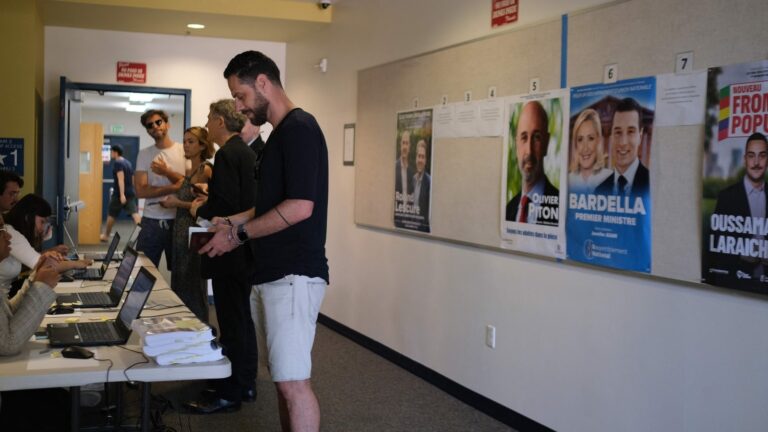French people will vote on Sunday in crucial early parliamentary elections that could change the country’s course and put Marine Le Pen’s far-right party in power for the first time in history.
As Russia’s war with Ukraine enters its third year and energy and food prices rise sharply, support for the anti-immigration, eurosceptic National Rally (RN) party is surging, despite President Emmanuel Macron’s pledge to halt its rise.
Polling stations across mainland France open at 8 a.m. (6 a.m. GMT) for the first round and close 12 hours later, after which forecasts are published that usually predict the election outcome with some accuracy.
Voters in France’s overseas territories around the world cast their ballots at the beginning of the weekend. Around 49 million French people are eligible to vote.
Elections for the 577 seats in the National Assembly will be held in two rounds, with the shape of the new parliament to be revealed in the second round a week later, on July 7.
Most opinion polls suggest the National Coalition is on track to win the most seats in the lower house, the National Assembly, but it remains unclear whether the party will be able to secure a majority.
Turnout is expected to be high, with final opinion polls showing the RN getting 35-37% of the vote, the left-wing New Popular Front coalition 27.5-29% and Macron’s centrist bloc 20-21%.
If the RN wins an absolute majority, its leader, Jordan Bardella, a 28-year-old protégé of Ms Le Pen with no governing experience, could become prime minister in a tense “coexistence” with Mr Macron.
A government source told AFP that President Macron will convene a government meeting on Monday to decide on the next course of action.
Mujtaba Rahman, European head at risk consultancy Eurasia Group, said France was facing a year of political turmoil and confusion with its parliament in limbo.
“Such a deadlock is unprecedented in recent French politics,” Lerman said.
Call for mobilization
Macron’s decision to call early elections after the RN’s strong performance in European Parliament elections this month stunned friends and foes and sparked uncertainty in Europe’s second-largest economy.
The Paris Bourse fell 6.4 percent in June, its biggest monthly drop in two years, according to figures released on Friday.
In an editorial, French daily Le Monde said the time had come to unite against the far right.
“To surrender any power to it would be to risk seeing the gradual collapse of everything that has been built and conquered over more than two and a half centuries,” the statement said.
Several activists from the feminist group Femen demonstrated topless at Paris’ Trocadero on Saturday, dressed as cleaners and carrying mops and buckets, chanting anti-far-right slogans.
Meanwhile in Paris, thousands of people took part in an LGBT Pride march, some carrying signs targeting the far right.
“I think it’s even more important now to fight hatred in general in all its forms,” said student Themis Harin Maret, 19.
A surge in hate speech
Many have pointed to a surge in hate speech, intolerance and racism during the much-criticised election campaign, with a video going viral in recent days showing two RN supporters verbally attacking a black woman.
Macron condemned “racism and anti-Semitism.”
Macron appeared to be trying to surprise his political opponents by presenting voters with a crucial choice about France’s future, but observers say he may have lost the bet.
Support for Mr Macron’s centrist bloc has collapsed, while left-wing parties have set aside their differences to form a new Popular Front, modelled on a league founded in 1936 to fight fascism.
Analysts say Ms. Le Pen’s years of efforts to improve the image of the party co-founded by a former Waffen-SS officer and which has pledged to boost purchasing power, curb immigration and strengthen law and order are paying off.
“Victory is within reach, so seize this historic opportunity and go out and vote!” Le Pen wrote on social media platform X on Friday.
Under Macron, France has been one of Ukraine’s main Western backers since Russia invaded the country in 2022.
But Le Pen and Bardella have said they would scale back French support for Ukraine by eliminating the deployment of ground troops and long-range missiles.
President Macron has warned voters that a victory for the far right or far left could lead to a “civil war” but is sticking to his decision to hold the election.
He has insisted that he will serve the remainder of his second term until 2027, regardless of which party wins.

